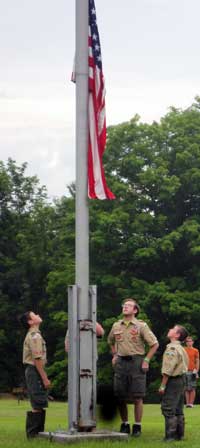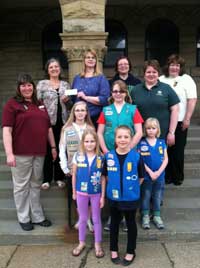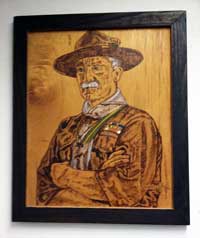In 1908 Robert Baden-Powell, a lieutenant general in the British Army, wrote a book called Scouting for Boys. This book emphasized practical outdoor activities, including camping, hiking, backpacking, swimming and camaraderie. The publication of this book serves as the generally accepted starting point for what has been called the Scouting Movement. The Boy Scouts were born.
In 1909, Baden-Powell held the first Scout Rally at The Crystial Palace, in London. Many boys attended the rally but, much to his surprise, Baden-Powell was greeted by a large group of girls dressed in scout uniforms. They explained that they were the "Girl Scouts." At this point Baden-Powell realized how much of an interest girls might have in scouting. A year later Baden-Powell and his sister Agnes introduced the Girl Guides - also affectionately known as the "Girl Scouts."
Fast forward over one hundred years later and scouting is still alive and well, found in most countries around the world. Scouting still emphasizes the same principals of mental, physical and spiritual development that it did in the beginning. Most importantly, however, scouting creates a foundation of good character that can be built upon.
During his time as an Eagle Scout, an assistant scout master in the Westmoreland-Fayette Council of Boy Scouts of America, a school teacher, a police officer and an agent for the FBI, Sam Hicks never lost sight of his basic foundation as a scout. Sam always kept himself strong, helped other people and did his duty - all virtues found in the Scout Oath.
The Samuel S. Hicks Memorial Fund makes annual donations to the Boy Scouts of America and the Girl Scouts of America. These donations help boys and girls participating in these programs with camp fees, Eagle Scout projects, equipment purchases, and funding for trips. To learn more about scouting, visit: www.wfbsa.org and www.girlscouts.org.
In 1909, Baden-Powell held the first Scout Rally at The Crystial Palace, in London. Many boys attended the rally but, much to his surprise, Baden-Powell was greeted by a large group of girls dressed in scout uniforms. They explained that they were the "Girl Scouts." At this point Baden-Powell realized how much of an interest girls might have in scouting. A year later Baden-Powell and his sister Agnes introduced the Girl Guides - also affectionately known as the "Girl Scouts."
Fast forward over one hundred years later and scouting is still alive and well, found in most countries around the world. Scouting still emphasizes the same principals of mental, physical and spiritual development that it did in the beginning. Most importantly, however, scouting creates a foundation of good character that can be built upon.
During his time as an Eagle Scout, an assistant scout master in the Westmoreland-Fayette Council of Boy Scouts of America, a school teacher, a police officer and an agent for the FBI, Sam Hicks never lost sight of his basic foundation as a scout. Sam always kept himself strong, helped other people and did his duty - all virtues found in the Scout Oath.
The Samuel S. Hicks Memorial Fund makes annual donations to the Boy Scouts of America and the Girl Scouts of America. These donations help boys and girls participating in these programs with camp fees, Eagle Scout projects, equipment purchases, and funding for trips. To learn more about scouting, visit: www.wfbsa.org and www.girlscouts.org.




